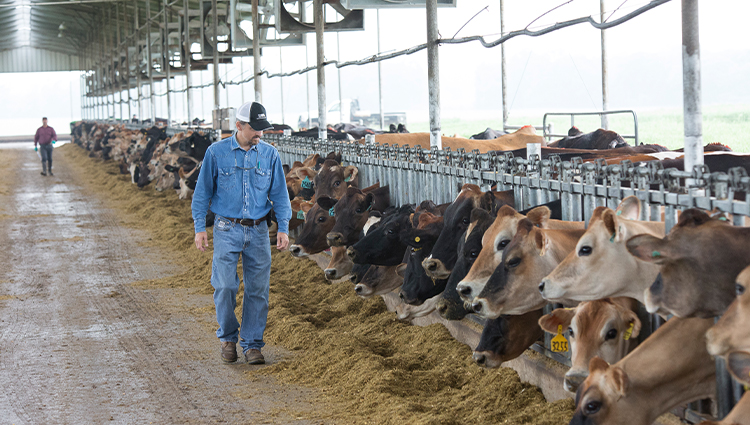I’m an educator who’s all about nutrition – but I’ve recently shifted from educating on the nutrients in food to educating about the food system and sustainable nutrition. Why is this so crucial? It starts with understanding what sustainable nutrition is.
What is sustainable nutrition?
Our understanding of sustainable nutrition is ever-evolving, but consider these definitions.
- The National Dairy Council defines sustainable nutrition as:
… the ongoing science-based pursuit for solutions that provide affordable, accessible, nutrient-rich foods that can nourish the world’s growing global population, while also protecting environmental resources.
- The Food and Agriculture Organization of the United Nations (FAO) defines sustainable nutrition as:
… diets with low environmental impacts which contribute to food and nutrition security and to healthy life for present and future generations. Sustainable diets are protective and respectful of biodiversity and ecosystems, culturally acceptable, accessible, economically fair and affordable; nutritionally adequate, safe and healthy; while optimizing natural and human resources.
At its simplest, sustainable nutrition is when the nutrition, health and lifestyle of people are in balance with the health of the planet.
Why is sustainable nutrition important to health professionals?
Decades of nutrition research link diet directly to human health. On a broader scale, our consumption behaviors also affect the health of animals and the planet – which in turn affects our ability to produce nutritious food in the future. It’s only logical that health professionals should advocate for a sustainable and resilient food system.
Dietitians as sustainable nutrition leaders
If we want to implement real change and discover smarter approaches to agriculture, we need a critical understanding of all the components of a food system and the Sustainable Food System Model. Natural and human resources, food policy, economics, education, technology and social values all turn the cogs of the supply chain from production to distribution, food access and consumption.
Montana State University is making great strides to educate the next generation of dietitians on sustainability. The dietetic internship program connects individual and community health with an understanding of food systems as a whole. We accomplish this by combining traditional academics with experiential learning – such as touring agricultural production sites and working in food processing businesses and community-based agricultural systems. Our dietetic interns learn from farmers, ranchers, food production business owners and chefs, so they emerge from the program with an understanding of and appreciation for the daily work required to produce healthy food and the positive impact of a sustainable food system. It’s a true “field-to-plate” point of view.
How can we support a sustainable food system?
Globally, the environmental pressures of food production are significant with concerns related to human population growth, food consumption (eaten and wasted) and food production.
Approaches to mitigate these effects are proposed from three perspectives:
- Productionist – produce more food with improved efficiencies
- Reductionist – reduce overconsumption or alter the diet
- Return to Nature – rebalance food production systems and return to a nature-mimicked farming approach
As dietitians working day to day with communities and clients, our approach deals more with individual application – like which foods to focus on and where to buy them.
Dairy places sustainable nutrition at the forefront
Dairy is an excellent example of a real food that is sustainable and supportive of a healthy diet. Dairy foods provide essential nutrients, such as calcium, potassium and vitamin D, and are responsibly produced by a community striving for accountable production, with continuing improvements in water and animal waste handling, plus feed and production practices.
Other practical actions to support sustainability
- Incorporate more local and regionally produced foods into your daily meals
- Eat more sustainably produced foods and support local agriculture options, such as food stands, farmers markets and community-supported agriculture operations
- Enjoy homemade meals more often – gather friends and family at the dining table and reconnect the joy of food flavors, textures and colors with conversation and kinship
- Be a wise consumer – plan meals, use a shopping list, use up the foods you buy and package leftovers for lunches, potentially lessening your food budget, your food waste and your waistline
- Start a reduce, reuse, recycle program at your workplace




